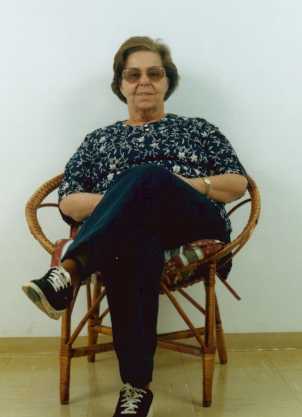|
|
|||

|  ESPAÑOL ESPAÑOL PORTUGUÊS PORTUGUÊS |
||
She was born in the 05.03.1937, in São Paulo's periphery. Parents of few resources, early it gathered the father's severity according to the discipline of the army and the mother's austerity that very early she learned how to fight for the survival without opening hand of the rigorous commands .Over those parameters Zoraide it structured their project of life, almost always through utopian ideals.
The professional option didn't escape to its rule. Still in the childhood she had opportunity of he/she was the contrast between the traditional agriculture and those technically managed ones. She discovered in a Dutch immigrant the responsibility of the " fact ". He was na Agronomist, profession until which was then completely unknown for her. Their option was made. She would be Agronomist, to participate of the "sacred war" of impulse of the Agriculture for conquest of an exuberant production.. Evidently, in their tender age, their objective was intuitive and she comes to take body in the long trajectory to the banks of the University.
She entered in the Superior School of Agricultura Luiz of Queiroz", with their colleagues to face, to combat and to defeat all the macho prejudices against the women in the Agronomy. In 1958 Zoraide it was then part of the biggest group in women until it approved in the same vestibular exam: seven. It concluded the course and to enter in the Public Service, being devoted with enthusiasm to the activity that had as their mission,: drifting for the rational use of pasture, in scientific investigator's career.
Although, in spite of their ideals, Zoraide went to the few ones you gone of the technical activities and he/she begins to have upward participation in the superior levels of address of the Secretary of Agriculture. In that exercise, the opportunity you creó of to reveal and to use the comfort of writing. This made of Zoraide the most suitable servant to rescue the Secretary's memory that would complete their first centennial in 1991. Beginning the investigation and the documental meeting in 1989, he/she wrote the book Agricultura Paulista: a bigger History that 100 years."
Inclination that investigation Zoraide found the character of Morgado of Mateus, until then for her completely unknown. Fellow man encounter brought him the surprising revelation of information that she took it to conclude or as much as important was the performance of Morgado of Mateus for São Paulo's economic development, later begun with the extraordinary expansion of plantation of the coffee in São Paulo. Would it have passed the such expansion if Morgado did not impose to inhabitants of Paulo of then to work the earth and to be devoted to the plantation of thesugar cane ? Zoraide believes that not. With enthusiasm, Zoraide submerged in the official correspondence of Morgado when Governor of the S. Paulo, besides other works. But the administrative facet was not only enough. She wanted him to be known to the man and the where their character was forged. It enlarged their bibliographical searches and he/she went to Portugal and it visited the representative places in the life of Morgado of Mateus.
They are already approximately eight years dedicated to the work (since their conception to their popularization) that besides the focus centered in the character of Morgado, it still frames the antecedent information or the period contemporaries that probably influenced in the formation, the action or the reaction of the character. Information of the New and Old Worlds that delineate the aisaje of the time, in political, economic, diplomat and social terms. A work whose title is Not more than a General Captain", it presented in three volumes of holding The Nobleman", "The Governor" and "The Destitute one."
Nevertheless Zoraide never has had the intention of writing as novelist, he/she took a risk in that modality for, different an academic work, to reach a bigger contingent of readers that you/they take it the information that considers that starting from significant importance he/she knows a period of Brazil and, mainly, of São Paulo, so little for us studied.


 AUTHOR'S E- MAIL
AUTHOR'S E- MAIL
 WRITERS' INDEX
WRITERS' INDEX  NEXT WRITER
NEXT WRITER
 REBRA
REBRA
 PERSONAL LINKS
PERSONAL LINKS 